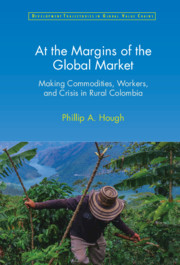Book contents
- At the Margins of the Global Market
- Development Trajectories in Global Value Chains
- At the Margins of the Global Market
- Copyright page
- Contents
- Figures and Tables
- Acknowledgments
- Introduction
- 1 Toward a Sociology of Labor and Development at the Margins of the Market
- Case Study #1 The Rise and Fall of Hegemony in the Coffee Regime of Viejo Caldas
- Case Study #2 Despotism and Crisis in the Banana Regime of Urabá
- Case Study #3 The Rise and Fall of FARC Counter-Hegemony in the Coca Regime of Caquetá
- Conclusion
- Appendix
- References
- Index
1 - Toward a Sociology of Labor and Development at the Margins of the Market
Published online by Cambridge University Press: 07 January 2022
- At the Margins of the Global Market
- Development Trajectories in Global Value Chains
- At the Margins of the Global Market
- Copyright page
- Contents
- Figures and Tables
- Acknowledgments
- Introduction
- 1 Toward a Sociology of Labor and Development at the Margins of the Market
- Case Study #1 The Rise and Fall of Hegemony in the Coffee Regime of Viejo Caldas
- Case Study #2 Despotism and Crisis in the Banana Regime of Urabá
- Case Study #3 The Rise and Fall of FARC Counter-Hegemony in the Coca Regime of Caquetá
- Conclusion
- Appendix
- References
- Index
Summary
This chapter begins with a discussion of the main insights of labor regimes scholarship, including its focus on questions of labor control and its use of the neo-Gramscian distinction between consensual and coercive mechanisms of labor control. It then explains the analytic limits of this consent–coercion dichotomy when analyzing labor regime dynamics in peripheral regions of world capitalism. It then develops an ideal-typical framework intended to understand the crisis tendencies of labor regimes that exist in peripheral locations of the world market, distinguishing “hegemonic” and “despotic” labor regimes from regimes marked by “crises of labor control” or “counter-hegemony.” It then draws from insights from world-systems scholarships on the social precarity of fully proletarianized labor systems and on the core–periphery dynamics of global commodity chains to explain how the convergence of processes of peripheralization and proletarianization, or peripheral proletarianization, has a particularly destabilizing impact on local labor regimes. It ends with a discussion of how both processes of proletarianization and peripheralization are impacted by larger structural and institutional dynamics associated with the rise and decline of US world hegemony.
Keywords
- Type
- Chapter
- Information
- At the Margins of the Global MarketMaking Commodities, Workers, and Crisis in Rural Colombia, pp. 30 - 46Publisher: Cambridge University PressPrint publication year: 2022



